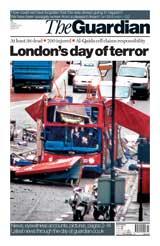 I've bought a number of papers today. The pictures are horrific. There were bodies hanging out of the bus, splattered on the British Medical Association wall where the blue plaque hung declaring Charles Dickens lived on Tavistock Square, and the eyewitness accounts are even more graphic, including people who were just torsos with no limbs on the sidewalk by the bus. Apparently doctors tried to save one such person, but the blood loss was too great. Inside the tube was just as awful, if not worse. Amputations, severe burns, and lost eyes and hearing are what the more than 700 injured are dealing with. The death toll will continue to rise--it's now over 50--as they continue to reach the bodies still trapped under us in Russell Square. Apparently, the rescuers still haven't reached the first car in the tunnel where the bomb went off and it's likely they'll find even more bodies.
I've bought a number of papers today. The pictures are horrific. There were bodies hanging out of the bus, splattered on the British Medical Association wall where the blue plaque hung declaring Charles Dickens lived on Tavistock Square, and the eyewitness accounts are even more graphic, including people who were just torsos with no limbs on the sidewalk by the bus. Apparently doctors tried to save one such person, but the blood loss was too great. Inside the tube was just as awful, if not worse. Amputations, severe burns, and lost eyes and hearing are what the more than 700 injured are dealing with. The death toll will continue to rise--it's now over 50--as they continue to reach the bodies still trapped under us in Russell Square. Apparently, the rescuers still haven't reached the first car in the tunnel where the bomb went off and it's likely they'll find even more bodies.The pictures of those missing are beginning to be posted in our neighborhood.
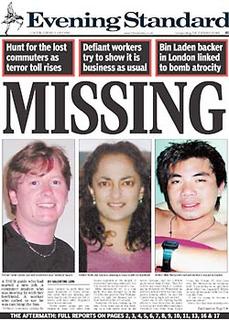 Today it's hitting me and I can't stop crying. It's like I felt living in Boston on 9/11 all over again, except so much closer and this time it really could have been me. The spouses, families and friends of missing are making pleas on the news for any information. It's hard to handle. It's stirring emotions and traumatic memories I thought I'd forgotten.
Today it's hitting me and I can't stop crying. It's like I felt living in Boston on 9/11 all over again, except so much closer and this time it really could have been me. The spouses, families and friends of missing are making pleas on the news for any information. It's hard to handle. It's stirring emotions and traumatic memories I thought I'd forgotten. Jasper is especially frustrated. We went all the way to his school this morning only to find out that it has been closed. The news said nothing of schools being closed, but I've since learned that it's the Muslim population here heeding a warning they've been given by some Muslim organization that they should not go out at all, especially the veiled women. Since his school is probably 80% muslim, I guess they spread the word among themselves, but it was a very long way for us to travel only to be turned away.
I don't feel any anti-muslim sentiment from other people, but then noone is talking. Everyone just looks stunned still. Judd street (our street) has become the one of the main diversion streets for Southhampton traffic (where the bus was bombed) and it's just a solid line of cars that barely move. We walked up to Euston Road this morning amid Jasper's tearful complaints that we
 couldn't just ride a bus and I talked with a cab driver who said there was no chance of getting to Camden in a cab given the traffic. Once we got to Euston, I hailed a cab and he drove us up the back streets through the projects. Jasper wailed and screamed when we got to his school and it was closed--on the day he thought he would be giving out the farewell certificates he made for his classmates, no less. I can't blame him. I bought him a treat since it's Friday, even though we usually buy them after school, and he opened up the bag and the candies went flying everywhere. More screaming. A very old man came up and handed him a pound to buy another bag of candy, which I would have done anyway, but it was the most touching gesture and I was completely choked up. The thought of walking back home was more than Jasper could bear so amid his sobs, and against my better judgement and Emily's admonition, I agreed to take the bus with him.
couldn't just ride a bus and I talked with a cab driver who said there was no chance of getting to Camden in a cab given the traffic. Once we got to Euston, I hailed a cab and he drove us up the back streets through the projects. Jasper wailed and screamed when we got to his school and it was closed--on the day he thought he would be giving out the farewell certificates he made for his classmates, no less. I can't blame him. I bought him a treat since it's Friday, even though we usually buy them after school, and he opened up the bag and the candies went flying everywhere. More screaming. A very old man came up and handed him a pound to buy another bag of candy, which I would have done anyway, but it was the most touching gesture and I was completely choked up. The thought of walking back home was more than Jasper could bear so amid his sobs, and against my better judgement and Emily's admonition, I agreed to take the bus with him.The busses were crowded with people, but it felt strange and I was scared the whole time. A woman sitting in the back was crying and wiping her eyes and everyone else, myself included, seemed to be scanning everyone there looking for anything out of the ordinary.
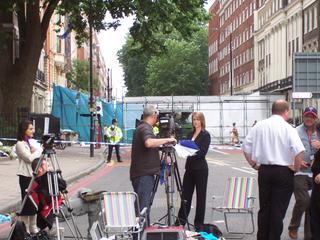 We got off where the service ended at Euston and walked past the masses of TV crews with cameras pointing toward the giant screens that now shield the bus from view. As we walked along Euston, the 30 bus was almost empty, however. (That's the one that blew up yesterday which was rerouted after the road was closed by Kings Cross). Perhaps they'll need to change its number.
We got off where the service ended at Euston and walked past the masses of TV crews with cameras pointing toward the giant screens that now shield the bus from view. As we walked along Euston, the 30 bus was almost empty, however. (That's the one that blew up yesterday which was rerouted after the road was closed by Kings Cross). Perhaps they'll need to change its number.We went to Starbucks to wait for the British Library to open where Jasper really enjoyed the exhibits on the Ugly Duckling--an enticement to keep him happy after the extremely disappointing morning. He especially liked all the interactive computers and headphones. He started yelling 'Help! I need somebody! Help!' until I could rush over and tell him not to sing along so loudly to the Beatles songs alongside the display of their lyrics writtne on the back on napkins and such.
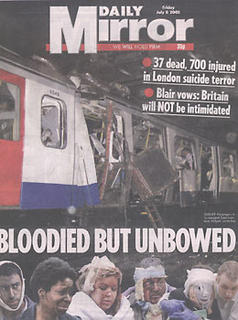 Instead he just danced and flailed his arms around to the music. I quite enjoyed looking around at the Magna Carta, 12th century latin Bibles, etc. while he was so obviously occupied.
Instead he just danced and flailed his arms around to the music. I quite enjoyed looking around at the Magna Carta, 12th century latin Bibles, etc. while he was so obviously occupied.We then went to the British Museum (the mummy museum to Jasper) because he couldn't walk all the way down to St. Martin in the Fields church by Trafalgar Square to do a brass rubbing there. We'll make the journey there tomorrow. Hopefully his school will be open Monday because I'm getting very little done. I didn't bargain on all of this disruption without Emily here.
While we walked around our neighborhood (trying to find an open street to get out through), I took some pictures of how eerie it is the day after. Our neighborhood has been completely turned upside down. Major streets are blocked off with police guarding them (Jasper said to one, 'pretty bad disaster, ain't it?), there are news helicopters overhead, frequent sirens (like right now) and it's a media circus.
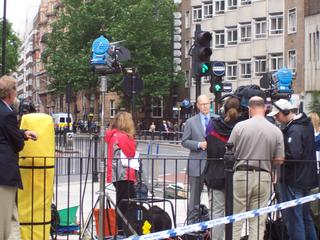 We even saw Harry Smith doing his reporting for the CBS Early Show from Russell Square today. If you're interested in more detailed UK coverage of developments, this is a good site with links to all the major papers: http://www.wrx.zen.co.uk/britnews.htm
We even saw Harry Smith doing his reporting for the CBS Early Show from Russell Square today. If you're interested in more detailed UK coverage of developments, this is a good site with links to all the major papers: http://www.wrx.zen.co.uk/britnews.htmOverall, today was much harder for me than yesterday. Perhaps it was because there were so many people to talk to between everyone's concern for us as well as calling much of the ward to ascertain their whereabouts. I just kept choking up all day long today. It was somewhat embarrassing when we'd be walking around and I would suddenly have to wipe my eyes because tears were streaming down my cheeks. Jasper said one of the most heartfelt prayers tonight I've ever heard him say, being thankful we werre safe and then blessing everyone we know to be safe (calling many by name), blessing the rescue workers, the people who were blown up, and blessing Gracie and heer new foal at the ranch to be safe too. Clearly, it's affecting him too, but it's still refreshing to see how the 5-year old mind can cope. Strangely, we were talking about 9/11 just before we learned about the bombs here. He was looking at a picture at the doctor's office of the Twin Towers in a book about tallest buildings and he remembered that these buildings fell down. He asked why would anyone do that? Now, all of London is asking the same question.
